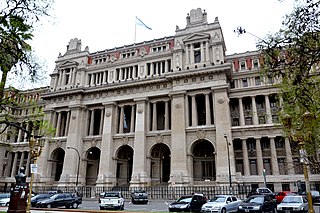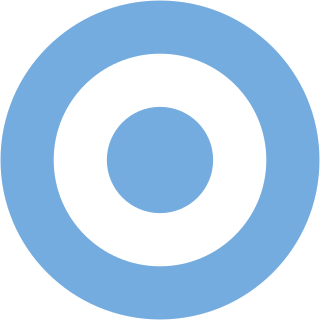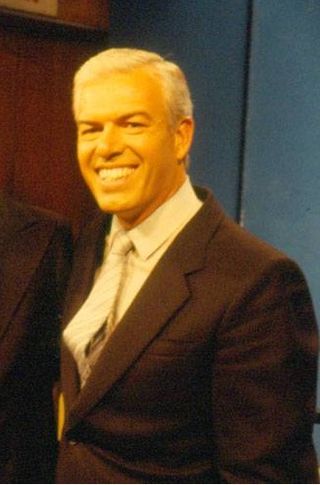
Corrientes, officially the Province of Corrientes is a province in northeast Argentina, in the Mesopotamia region. It is surrounded by : Paraguay, the province of Misiones, Brazil, Uruguay, and the provinces of Entre Rios, Santa Fe and Chaco.

Santiago del Estero, also known simply as Santiago, is a province in the north of Argentina. Neighboring provinces, clockwise from the north, are Salta, Chaco, Santa Fe, Córdoba, Catamarca and Tucumán.

La Nación is an Argentine daily newspaper. As the country's leading conservative newspaper, La Nación's main competitor is the more liberal Clarín. It is regarded as a newspaper of record for Argentina.

Cuyo is the wine-producing, mountainous region of central-west Argentina. Historically it comprised the provinces of San Juan, San Luis and Mendoza. The modern New Cuyo includes both Cuyo proper and the province of La Rioja. New Cuyo is a political and economic macroregion, but culturally La Rioja is part of the North-West rather than of Cuyo.

The Toba people, also known as the Qom people, are one of the largest indigenous groups in Argentina who historically inhabited the region known today as the Pampas of the Central Chaco. During the 16th century, the Qom inhabited a large part of what is today northern Argentina, in the current provinces of Salta, Chaco, Santiago del Estero, Formosa and the province of Gran Chaco in the southeast of the Department of Tarija in Bolivia. Currently, many Toba, due to persecution in their rural ancestral regions, live in the suburbs of San Ramón de la Nueva Orán, Salta, Tartagal, Resistencia, Charata, Formosa, Rosario and Santa Fe and in Greater Buenos Aires. Nearly 130,000 people currently identify themselves as Toba or Qom. With more than 120,000 Qom living in Argentina, the Qom community is one of the largest indigenous communities in the country.

The Supreme Court of Argentina, officially known as the Supreme Court of Justice of the Argentine Nation, is the highest court of law of the Argentine Republic. It was inaugurated on 15 January 1863. However, during much of the 20th century, the Court and the Argentine judicial system in general, lacked autonomy from the executive power. The Court was reformed in 2003 by the decree 222/03.

The Argentine cockade is one of the national symbols of Argentina, instituted by decree on February 18, 1812 by the First Triumvirate, who determined that "the national cockade of the United Provinces of the Río de la Plata shall be of colours white and light blue [...]".

Juan Manuel Urtubey is an Argentine politician, lawyer, university professor and former governor of Salta Province. Formerly a senior figure in the ruling Front for Victory faction of the Justicialist Party (PJ) in the Argentine Chamber of Deputies and chairman of both the Constitutional Affairs Committee and the Peronist Caucus, Urtubey became governor in the 2007 elections, being only 38 years old. He was reelected in 2011 with almost 60% of the vote, and in 2015 with 51% of the vote.

The National University of Litoral is a public university in Argentina. It is based in Santa Fe, the capital of Santa Fe Province. It has colleges and other academic facilities in Esperanza, Reconquista and Gálvez, also in Santa Fe Province.

The General Manuel Belgrano Railway (FCGMB), named after the Argentine politician and military leader Manuel Belgrano, is a 1,000 mmmetre gauge railway and the longest of the Argentine system. It was one of the six State-owned Argentine railway companies formed after President Juan Perón's nationalisation of the railway network in 1948.
El Correo is a leading daily newspaper in Bilbao and the Basque Country of northern Spain. It is among best-selling general interest newspapers in Spain.

Juan Carlos Rousselot was an Argentine radio and television personality, newspaper publisher, and former mayor of the Greater Buenos Aires suburb of Morón.

Nanque S.A. is an Argentine sports equipment brand. The former manufacturing company was based in Banfield, Buenos Aires. Founded in 1969, its goal was to manufacture clothing and sportswear for professional and amateur sports, focusing on the association football market, where the company sponsored several teams not only in Argentina but in South and Central America. One of the Nanque's owners, Carlos Portell, was also president of Club Atlético Banfield from 1998 to 2012.
Events in the year 2020 in Argentina.
Events in the year 2021 in Argentina.

Juan Carlos Bacileff Ivanoff is an Argentine politician who served as interim governor of Chaco Province from 2013 to 2015. He was vice governor of Chaco from 2007 to 2015, serving under Jorge Capitanich; upon Capitanich's appointment as Cabinet Chief of Argentina in November 2013, Bacileff Ivanoff stepped in as governor in interim position until Capitanich's dismissal in February 2015.

This article presents official statistics gathered during the COVID-19 pandemic in Argentina. The National Ministry of Health publishes official numbers every night.

Aldo Adolfo Leiva is an Argentine politician and Falklands War veteran, currently serving as National Deputy elected in Chaco Province. A member of the Justicialist Party, Leiva was elected in 2019, and currently sits in the Frente de Todos parliamentary bloc. He previously served as intendente (mayor) of General José de San Martín, Chaco on two occasions, from 2009 to 2019, and from 2003 to 2008.

Elda Aída Pértile is an Argentine politician. Pértile has been active in politics since the 1980s; as a member of the local Acción Chaqueña party, she was elected intendenta (mayor) of Resistencia, Chaco in 1991, serving until 1995. She was also a member of the Resistencia City Council, and served in the Chamber of Deputies of Chaco during two consecutive terms from 2009 to 2017. From 2017 to 2021, she served as a National Deputy.
The Chelaalapí Qom Choir was created in 1962 in the Toba neighborhood in the outskirts of the city of Resistencia, Chaco, and became the first indigenous choir established in Latin America. The choir's name means "flock of thrushes".
















